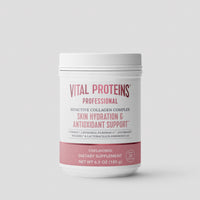Running has many benefits. You can improve your cardiovascular health and overall fitness. It can be done anywhere, and doesn't require much equipment — just a pair of running shoes. But that doesn't mean it’s easy to start.
Ready to lace up? Here, Anna Damone, Equinox Precision Run Certified Trainer tells you everything you need to know to get started.
Vital Note: This article has been made available for informational and educational purposes only. It is not intended to be a substitute for professional medical advice, diagnosis, or treatment. Always seek the advice of your physician or another qualified health provider with any questions you may have regarding a medical condition. Your licensed healthcare professional can best provide you with the diagnosis and treatment of any medical condition and assist you as well in deciding whether a dietary supplement will be a helpful addition to your regimen.

How long should you run as a beginner?
Start small — don't focus on mileage. Damone suggests starting with just a 20-minute run, increasing to 30, and so on as your body gets used to it. As with anything, take into account your fitness level when you start. You can even try alternating, walking for one minute, running for one minute, and working your way up to running for longer periods of time.
"When I played lacrosse I didn't 'enjoy' running, it felt more like a chore. Post my team sports days, I realized I missed that 'runner's high' feeling I’d get after," Damone says.
Don't necessarily think about distance or even how many breaks you need to take. Instead, turn on a playlist or podcast and get lost in that 20 or 30 minutes that you have to yourself. Before you know it, those 20 minutes you alternate walking and running will turn into a 5K.
How should a beginner start running?
First — get the right shoes! To do this, you can go to your local run store and they will get you fitted for the correct shoe. Everyone's feet and stride are different. Having the right shoe can change your running experience. Without the right shoe, you can be at risk of injury.
Once you're ready to lace up, pick a destination that you enjoy.
"Personally, I love running along the water and find comfort in the same outdoor run trail," says Damone. "It's therapeutic to take some time outdoors (or indoors if a treadmill is more your style) and just for that moment of the day be 1-on-1, you versus you!"
Related Articles
How many times a week should a beginner run?
As a beginner, it's truly all about figuring out what works for you. Maybe intervals are more your speed. Or, in building endurance and strength, maybe it's running at the same pace or finding the pace that you’re comfortable at. Just embrace the journey. Everyone had to start somewhere!
Vital Note: If things start to hurt—stop! It's your body saying you've done enough for the day or you need to take some time to rest.
I think figuring out a schedule two to three times a week and increasing that as you become more advanced is the perfect balance.
Sometimes setting a goal as well can help motivate you along that journey- whether it's to run a 5K in a month, or be able to participate in a run club. Get comfortable with being uncomfortable and run into the change and challenge!
If you need a support group, be sure to join our Vital Run Club.
How do you start running if you hate it?
If you hate running, or are out of running shape, Damone recommends one secret weapon: playlists. Who doesn't love tuning out the noise, throwing on your favorite song and getting lost in it?
"I can't tell you how many times I've listened to the same two songs that got me out of my head for the entire duration of a run on repeat," Damone says.
Find your favorite songs, channel what you're working toward (find your why — what motivates you) and stomp it out on the pavement!
"It is SO great to feel alive after a run," Damone says. "I fell in love with running when I realized how great mentally and physically I felt after."













